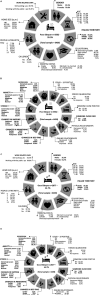Poor Sleep Quality and Its Consequences on Mental Health During the COVID-19 Lockdown in Italy
- PMID: 33304294
- PMCID: PMC7693628
- DOI: 10.3389/fpsyg.2020.574475
Poor Sleep Quality and Its Consequences on Mental Health During the COVID-19 Lockdown in Italy
Abstract
Background: Coronavirus disease 2019 (COVID-19) seriously affected the whole of Italy. The extreme virulence and the speed of propagation resulted in restrictions and home confinement. This change was immediately perceived by people who found themselves exposed to feelings of uncertainty, fear, anger, stress, and a drastic change in the diurnal but above all nocturnal lifestyle. For these reasons, we aimed to study the quality of sleep and its connection to distress levels and to evaluate how lifestyle changed in the Italian population during the lockdown.
Methods: By means of an Internet survey we recruited 6,519 adults during the whole of the COVID-19 lockdown (from March 10-1st phase to May 4-2nd phase). We investigated the sociodemographic and COVID-19-related information and assessed sleep quality using the Medical Outcomes Study-sleep scale (MOS-SS) and mental health with the short form of Depression, Anxiety, and Stress Scales-21 Items (DASS-21). Multiple logistic regression model was used to evaluate the multivariate association between the dependent variable (good sleeper vs. poor sleeper) and all the variables that were significant in the univariate analysis.
Results: A total of 3,562 (55.32%) participants reported poor sleep quality according to the MOS-Sleep Index II score. The multiple binary logistic regression results of poor sleepers revealed several risk factors during the outbreak restrictions: female gender, living in Central Italy, having someone close who died because of COVID-19, markedly changed sleep-wake rhythms characterized by earlier or postponed habitual bedtime, earlier habitual awakening time and reduced number of afternoon naps, and extremely severe levels of stress, anxiety, and depression.
Conclusion: This is the first study designed to understand sleep quality and sleep habits during the whole of the lockdown period in the Italian population that provides more than 6,000 participants in a survey developed specifically for the health emergency related to COVID-19. Our study found that more than half of the Italian population had impaired sleep quality and sleep habits due to elevated psychological distress during the COVID-19 lockdown containment measures. A multidisciplinary action should be undertaken in order to plan appropriate responses to the current crisis caused by the lockdown for the COVID-19 outbreak.
Keywords: COVID-19; Italian lockdown; anxiety; clinical psychology; depression; sleep habits; sleep quality; stress.
Copyright © 2020 Franceschini, Musetti, Zenesini, Palagini, Scarpelli, Quattropani, Lenzo, Freda, Lemmo, Vegni, Borghi, Saita, Cattivelli, De Gennaro, Plazzi, Riemann and Castelnuovo.
Figures

References
-
- Altena E., Baglioni C., Espie C. A., Ellis J., Gavriloff D., Holzinger B., et al. (2020). Dealing with sleep problems during home confinement due to the COVID-19 outbreak: Practical recommendations from a task force of the European CBT-I Academy. J. Sleep Res. 4:e13052. 10.1111/jsr.13052 - DOI - PubMed
-
- Benjamini Y., Hochberg Y. (1995). Controlling the False Discovery Rate: A Practical and Powerful Approach to Multiple Testing. J. Royal Statist. Soc. Ser. B 57 289–300. 10.1111/j.2517-6161.1995.tb02031.x - DOI

